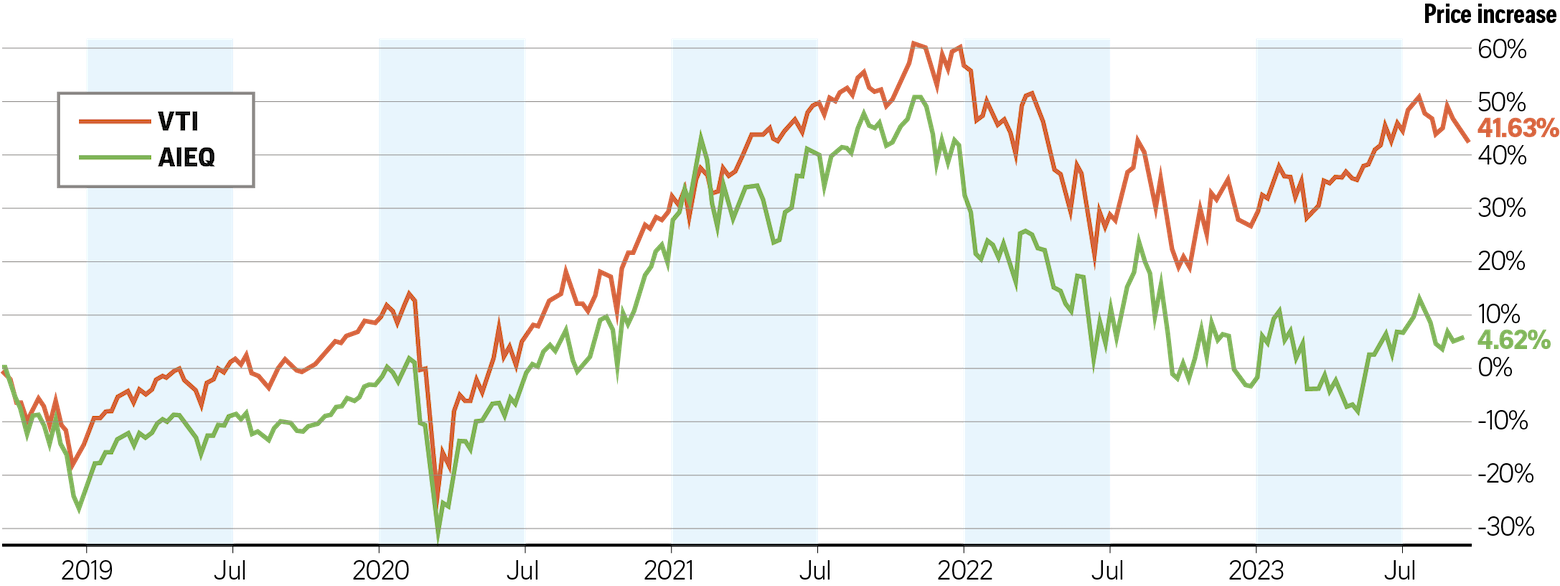BRANDED CONTENT
Human or artificial intelligence investing: Who wins?
Can AI do the heavy lifting for you when it comes to investing your hard-earned money? Not quite – yet

There is potential in AI investing, but the human touch is still essential to capture an investor’s nuances and provide tailored solutions across life stages, says experts.
PHOTO: GETTY IMAGES
Like most of her peers, account executive Sandra Lim, 28, prefers activities with a personal touch, such as meeting friends.
But when it comes to investing her hard-earned salary, she lets algorithms do the heavy lifting.
She does her own research for short-term plays such as trading Contracts for Difference – a financial derivative product which is valued on the price movements of underlying assets such as stocks, commodities and currencies.
But for long-term investments, such as exchange-traded funds (ETFs) and bonds, she lets robo-adviser platforms – such as Syfe and StashAway – choose her investments.
These are digital platforms that provide automated, algorithmic investment services with minimal human supervision, and typically follow a standardised approach based on an investor’s risk tolerance, investment goals, and other factors.
Ms Lim, who started her investing journey in 2019, chose these platforms based on word of mouth and her own research. Her risk appetite, she shares, ranges between conservative to moderately aggressive.
“My return expectations are between 6 and 12 per cent – a higher return from riskier and short-term investments, and lower returns from longer-term investments,” she says.
“But I don’t track the level of returns specifically. (I’m happy) as long as I’m getting some form of returns.”
With that, Ms Lim does not see the need to work with a human financial adviser – for now.
The UOB 2023 Asean Consumer Sentiment Survey (ACSS) reveals that her approach is fast catching on: Investors in Thailand and Vietnam are increasingly using robo-advisory platforms, and about three in four in the Asean region have used digital trading and wealth management platforms to invest.
Conducted in June, the ACSS surveyed 3,400 interviewees aged 18 to 65, in five countries – Singapore, Indonesia, Malaysia, Thailand and Vietnam.
Mr Abel Lim, head of wealth management advisory and strategy at UOB, notes the popularity of robo-advisers among younger investors but stresses that the trust and convenience that come with a human wealth management adviser “is essential”, especially when investors become more affluent, have more commitments, less time to monitor their investments and need personalised wealth solutions.
Which works better: Man or Machine?
For sure, fund managers have used computer-simulated models to identify investing themes, market factors and signals to structure investment strategies, says Mr Carl Chay, head of advice at boutique wealth management firm GYC Financial Advisory.
“But pure artificial intelligence (AI)-investing models are more autonomous,” says Mr Chay, 44. “It takes the initial investment strategies, which may be formed by humans, and adapts it to changing market conditions, with far less human supervision and intervention.”
According to Statista, a global data and business intelligence platform, the number of robo-advisory investors in Singapore is expected to grow from 648,500 this year to over 830,000 by 2027.
Although the reality of a retail fund purely run by AI has not arrived, the growing popularity of self-directed investing platforms begs the question: What are the current differences between traditional and AI investing?
The case for traditional
- Human judgement and experience: The sixth sense is critical in many decision-making processes including in investment decisions.
- Immediate decisions: Times of extreme volatility or market changes call for quick action. For example, a chief investment officer has the mandate to change, with or without client consultations.
- Immediate response: This applies to opportunistic plays. For example, if the market pivots and there is a chance to arbitrage, a fund manager can immediately call the client, who can give approval over the phone. Not so on a robo-advisory platform, which acts on set investing parameters and factors given by the investor.
- Adaptability: Robo-advisers carry out a specific set of functions to achieve your investment goals. It lacks the flexibility of a human adviser.
The case for artificial
- Automated decision-making: When AI comes across an opportunity, it will act based on the criteria programmed into the algorithms. For example, a robo-advisory can automatically rebalance your portfolio to maintain your asset allocation to keep your investments aligned with your financial goals.
- Fixed solutions: The robo-advisory acts on inputs given by investors such as risk profile, investment tenor, and expected returns. This provides you with a fixed set of investment solutions.
Mr Lim, however, advises investors to be cautious. “While AI-powered investment portfolios may seem efficient and accessible, these solutions are designed for the masses and are limited in their ability to provide tailored solutions.
“As such, they are unable to capture an investor’s nuances and customise accordingly to comprehensively meet the needs of an investor,” says Mr Lim, who is in his 50s.
This largely aligns with overall consumer sentiments. The ACSS notes that only 14 per cent of regional consumers trust robo-advisory and AI advisory platforms, and over two in five still prefer using either offline or a mix of online and offline channels for their investments.
He adds that as AI-powered portfolios generally rely on complex algorithms and are heavily backed by statistical models, robo-advisers will not be able to predict or even react appropriately to “black swan” – unpredictable with significant impact – events as there is no existing data.
“The AI models may also potentially misinterpret the event as it is unable to comprehend these ‘new’ data and respond accordingly.”
Not so elementary, my dear Watson
The US-based ETF Managers Group has run the AI Powered Equity ETF (AIEQ) since 2017 using supercomputer IBM Watson to manage the fund’s entire investment process.
Against a similar, traditionally-run fund, Vanguard’s Total Stock Market ETF (VTI) outperformed AIEQ by over 40 per cent during the same period.

SOURCE: GYC FINANCIAL ADVISORY
Performance markers
The proof is in the pudding, as they say; it lies in the performance, or returns generated. Given AI investing’s relatively short time in the retail market, the jury is out for now.
GYC’s Mr Chay believes the performance question is moot. “The investing process is just too complex and is but a small cog in the entire wealth management life cycle that requires both man and machine to work together to achieve the client’s outcome.
“We cannot tell the investors that the performance of their portfolio, whether up or down, is determined mainly by AI,” says Mr Chay.
“Our clients would want to review their performance with a human adviser to see whether they are on track or far from it, and discuss how to implement improvements, based on their evolving life cycle and financial needs.”
More on The Future of Finance
- Personalised preferred: More are investing and managing finances on their own with digital platforms, especially among young, tech-savvy investors. So where do human advisers fit in?
- Relationship with money: E-payment platforms have already transformed the way we pay. And as more consumers feel empowered to adopt technology with confidence, how will the future of spending, saving and investing look like?
- Financial woes: In a survey, two-thirds of Singapore respondents feel an economic downturn is likely to happen in the next six to 12 months. Why it’s important for this bank to digitalise amid volatile times.
What lies ahead
What’s clear is that AI plays an important role in shaping Singapore’s financial services landscape.
In 2021, the Government launched a National AI programme in Finance in a joint effort by the Monetary Authority of Singapore and the Smart Nation and Digital Government Office. It aims to develop Singapore as a global hub for financial institutions to research, develop, and deploy AI solutions.
This was followed by the launch of the Financial Sector Artificial Intelligence and Data Analytics (AIDA) Talent Development Programme in May.
But with AI getting smarter and learning faster, will there be no human intervention in the investing process? UOB’s Mr Lim believes that both are needed in the future.
“Both man and machines have their own shortcomings, and with AI and machine learning, we can use it to our advantage to cover human blind spots of bias and emotion in investing.”
That is why, he explains, the bank’s omnichannel strategy remains relevant going into the future, as it has a blend of people and technology.
“It has digital services for those who are comfortable managing certain wealth solutions on their own, and wealth management advisers available to provide enhanced personalised advice.”
The Future of Finance series explores how digital solutions and insights can empower individuals and businesses in a rapidly changing world, to create a more sustainable future.
This is the third of a 12-part series in partnership with



